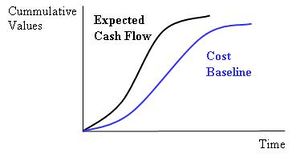Project cost management
| Project cost management |
|---|
| See also |
Project cost management involves all actions taken by project managers necessary to achieve project goals within agreed budget limits. All those activities are tightly linked and interrelated with each other. Project cost management include:
Resource planning in project cost management
Resource planning involve careful choice of resources, i.e. materials, equipment, people, which are required to complete the entire project. It is necessary to plan the exact number and amount of each resource. Resource plan has to closely correspond with cost estimated.
Structure of project cost management plan
Inputs to resource planning:
- work breakdown structure (WBS) - identification of all project components, tasks and activities that require resources,
- historical information, information about planning in similar projects in the past,
- scope statement, motives of undertaking the project and objectives,
- Resource pool description, availability of resources,
- organizational policies,
- estimates of task duration.
Tools and techniques for resource planning:
- expert judgement - the assessment of the outputs to the project,
- identification of alternatives.
Outputs from resource planning:
- Resource requirements, description of types and quantities of resources required for project execution.
Project cost management plan, includes all resources (material, human, financial) needed to complete the project, and associated cost of this resources (based on approximate market value). It is necessary to create budget of a project.
Cost estimating in project cost management
Cost Estimating involves forecasting of costs (prices) of the resources necessary for project..
Inputs to cost estimating:
- project work breakdown structure,
- organization of the cost estimates,
- resource requirements,
- resource prices (per unit rate, staff cost per hour, etc.),
- activity duration estimates,
- publications and commercial data about cost estimating (statistical forecasting, industry analyses, etc.),
- historical price and cost data,
- structure of financial reports inside the company,
- information about the possible risks.
Tools and techniques for cost estimating:
- estimating based on analogous projects undertaken in the past - top-down estimating of the current costs based on information about the costs of a previous, similar projects,
- parametric modelling - prediction of the project costs based on a mathematical model,
- bottom-up estimating - assessing the cost of individual activities and summarizing the individuals approximations,
- IT systems for cost accounting.
Outputs from cost estimating:
- cost estimates,
- supporting details,
- cost management plan.
Cost Budgeting in project cost management
Cost budgeting is the conversion the cost estimation into a feasible control budget. The outcome of the Cost Budgeting is a cost baseline for measuring project implementation.
Inputs to Cost Budgeting:
- cost estimates,
- identification of project components to which costs will be distributed,
- project Schedule - the beginning and the end dates for the project components to which costs will be distributed,
- risk management plan,
- cost budgeting tools and techniques.
Outputs from Cost Budgeting:
- cost baseline - budget planned for particular time periods and developed to calculate and control cost progress on the project. Cost baseline is a sum of estimated costs for each time period, usually presented as an S-curve (fig. 1).
Cost control in project cost management
Cost control contains monitoring and control of expenditures as the work proceeds as well as modifying the method if the results are not satisfactory
Inputs to cost control
- cost baseline,
- performance reports - the reports about project scope and project progress,
- change request,
- cost management plan.
Tools and techniques for cost control
- cost change control system - definition of the formulas and systems by which the cost baseline can be changed,
- performance measurement - measurement techniques which estimate the dimension of any modifications that happen,
- earned value management (EVM),
- additional planning,
- IT system.
Outputs from cost control
- revised cost estimates - modifications to the initial cost data,
- budget updates - changes in a cost baseline,
- corrective action,
- estimate at completion - calculation of the most probable total project costs,
- project close-out,
- lesson learned - documented and saved description of the all corrections and changes reasons.
Typical project cost escalation factors
- bias of managers and employees, bad execution,
- delivery/procurement problems,
- project schedule changes,
- engineering and construction complexities,
- scope changes,
- poor cost estimation,
- inconsistent application of contingencies,
- ambiguous contract provisions, bad contract wording,
- macroeconomic factors: inflation, interest rate,
- market conditions.
See also:
References
- Atkinson, R. (1999). Project management: cost, time and quality, two best guesses and a phenomenon, its time to accept other success criteria. International journal of project management, 17(6), 337-342.
- Chou, J. S. (2011). Cost simulation in an item-based project involving construction engineering and management. International Journal of Project Management, 29(6), 706-717.
- Jackson, S. (2002, September). Project cost overruns and risk management. In Proceedings of Association of Researchers in Construction Management 18th Annual ARCOM Conference, Newcastle, Northumber University, UK (pp. 2-4).
- PMI Standards Committee, & PMI Standards Committee. (1996). A guide to the project management body of knowledge. Project Management Institute.
- Shane, J. S., Molenaar, K. R., Anderson, S., & Schexnayder, C. (2009). Construction project cost escalation factors. Journal of Management in Engineering, 25(4), 221-229.
Author: Ewa Szczepankiewicz
